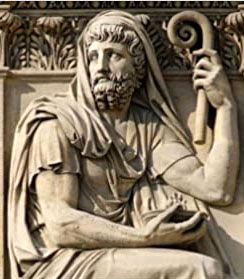Herodotus | Brief Biography
Herodotus | Brief Biography
Herodotus (485/480-425/413 BCE) was a Greek historian and philosopher, often referred to as the “Father of History”. He was born in Halicarnassus, which was then a part of the Persian Empire but is now located in modern-day Turkey. Herodotus was the first person to systematically collect and critically analyze historical events, and to use these events to construct a narrative that explored the cause-and-effect relationships between them.
Herodotus was a traveler and his wanderings took him to many places, including Egypt, Babylon, and the Greek colonies of the Black Sea. He was fascinated by the customs, beliefs, and cultures of the people he encountered, and he collected a wealth of information about their histories and legends. He also made a study of the conflicts between the Greeks and the Persians, and he was particularly interested in the wars between the Greeks and the Persians that took place in the early 5th century BCE.
Herodotus’s most famous work is “The Histories”, which he wrote in the Ionic dialect of ancient Greek. This work is a chronological account of the wars between the Greeks and the Persians, but it also provides a comprehensive overview of the ancient world and its peoples. It includes accounts of the customs and beliefs of various cultures, as well as the geography, natural resources, and political systems of the various regions that Herodotus visited or learned about.
One of the unique features of “The Histories” is Herodotus’s use of storytelling to bring the events of the past to life. He often included legends, myths, and popular tales in his accounts, as well as more factual information, and he used his narrative skills to create a vivid and engaging picture of the ancient world. This approach to history writing was innovative, and it has been widely imitated by later historians.
In addition to “The Histories“, Herodotus wrote several other works, including a lost biography of his contemporary, the poet Panyassis, as well as several treatises on various topics, including the geography of the Nile River, the customs of the Scythians, and the causes of the Greco-Persian Wars.
Herodotus‘s work had a profound impact on subsequent generations of Greeks and Romans, and he has been widely regarded as a pioneering historian and philosopher. He is often considered the first true historian, as he sought to gather reliable information and to present it in a systematic and critical manner. His work laid the foundation for the development of historical writing and helped to establish the discipline of history as a distinct field of study.
Herodotus’s legacy continues to influence the way we think about the past and the study of history. His approach to history-writing, which emphasized the importance of careful investigation, critical analysis, and the use of storytelling, has had a lasting impact on the discipline and has inspired generations of historians and thinkers. 0 0 0.
N. B. This article originally belongs to the book, ‘Brief Biographies of Ancient Thinkers and Writers‘ by Menonim Menonimus.
Books of Biography by M. Menonimus:
- The World Writers-Brief Biographies
- Introduction to World Writers
- Introduction to World Personalities
- Love of Reputed Persons ..
Additional Searches:











